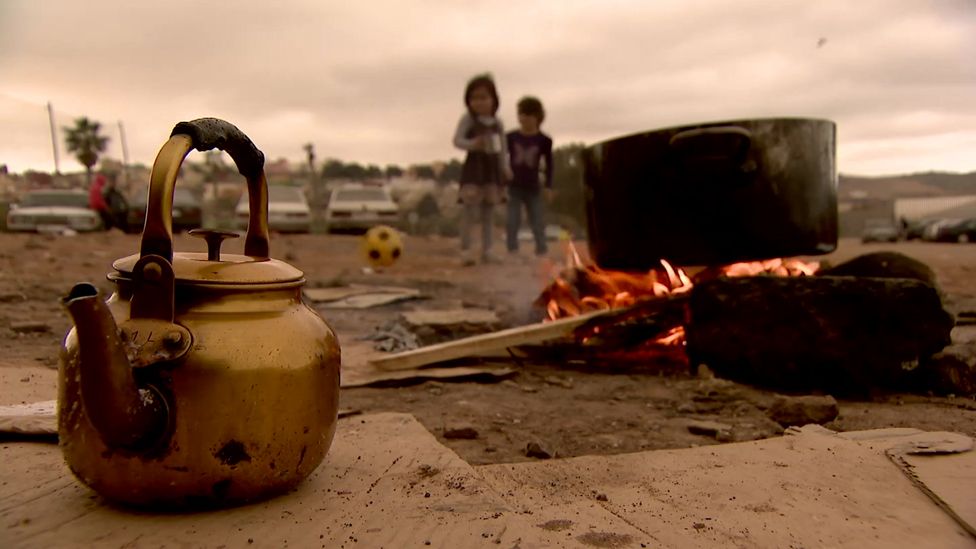The children who need to play
- Published

Thirty percent of the migrants and refugees who reached Europe last year were children. Despite their long and dangerous journey, the youngsters still need to find ways to play.
"We're all on our own journeys," said Abdulrahman. "But some are a little longer than others."
It was past midnight and we were on the upper deck of a car ferry, watching the twinkling lights of Melilla fade slowly to black. A Spanish enclave in Africa - it is about as far from Syria as you can get around the long and winding coastline of the Mediterranean Sea.
But as one year has given way to another, more and more Syrians are going to extraordinary lengths to escape the killing fields of home. Abdulrahman had travelled via Algeria and Morocco to get here. He's just turned 18.
The al-Ali family had flown all the way to Mauritania on Africa's Atlantic coast, before making their way north by hook or by crook, through the borderlands of the Sahara desert. And now, after weeks of waiting, all of them had been given a one-way ticket by the Spanish authorities - leaving Melilla for the Spanish mainland, and the European continent.
Even on the ferry, even in the darkness, it is always the children that you notice first. Their combination of vulnerability and resilience. Of fear and wide-eyed wonder. There are tears and exhaustion. Shy smiles and woolly hats.
A little girl staring through the railings at a whole new world.
But what often stands out, in the most extraordinary of circumstances, is the simple pleasure all children get from having a chance to play.
Over the past couple of months I've seen a game of catch-the-life-jacket on a Greek beach, minutes after a group of Syrian families staggered ashore from their rubber dinghy on to safe ground.
There was a jump-the-guy-ropes race among the tents clustered close to the Macedonian border. The winner fell over, but got up and kept running.
And in Melilla, as we waited to set sail, there was sheer delight and intense concentration on the faces of two toddlers riding up and down the escalators in the ferry terminal.
Their parents keep watch - hoping, praying, that nothing goes wrong. They are in turn anxious, proud, worried, relieved. Living their lives in perpetual motion, carrying their bags and their children - a ferry from Melilla a far safer option than a smuggler's rubber dinghy from the Turkish coast.
Find out more
- From Our Own Correspondent has insight and analysis from BBC journalists, correspondents and writers from around the world
- Listen on iPlayer, get the podcast or listen on the BBC World Service or on Radio 4 on Thursdays at 11:00 and Saturdays at 11:30
Ah yes, some will say. The children make great pictures for voracious television cameras. Who can fail to be moved? But the real story is all those young men, travelling alone, arriving in Europe.
Yes and no.
Figures from the UN's refugee agency show that of the million and more migrants and refugees who reached Europe by sea last year, nearly half were men. But more than 30% were children.
Syria is losing its next generation, and Europe is wondering what to do with them all.
Efforts to describe the scale of this refugee crisis have taken on liquid form - a flood, a tide, a torrent - suggesting that it is impossible to stop.
More figures from the UN make sobering reading. So far this month, about six times as many people have arrived by sea in Europe as they did in the whole of January 2015. If arrivals peak again in the hot summer months, that could have an effect on everything from the viability of the Schengen passport-free zone, to the result of the British referendum on EU membership.
We are in the middle - or perhaps still at the beginning - of a mass movement of people on a historic scale. How we choose to respond will shape our world.
Ending the war in Syria would close one open wound, but there will be others. Conflict, economic disparity and climate change all drive migration.
How can it possibly be controlled?
In Melilla, the answer is a fence. A towering triple-layered fence, patrolled all day and all night, up every hill and down every dale of the border.
It is Fortress Europe.
Syrians seeking asylum are allowed to stay but many other nationalities - mainly Africans - are regularly turned away.
And on this European land border with Africa, they wait and watch and plan how to take their next steps towards the glittering prize of a new life.
It's almost close enough to touch, but still out of reach. So they won't stop trying.
Plans to improve conditions in their home countries through aid, trade and investment will take decades to bear fruit.
But in a matter of hours a ferry ploughing through the dark waters of the Mediterranean from Melilla to mainland Spain could offer all of them them the chance of a fresh start.
And given the choice, which would you choose?
Subscribe to the BBC News Magazine's email newsletter to get articles sent to your inbox.